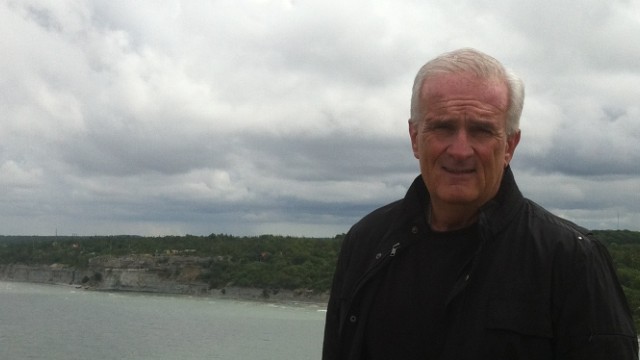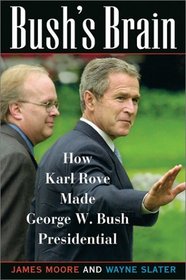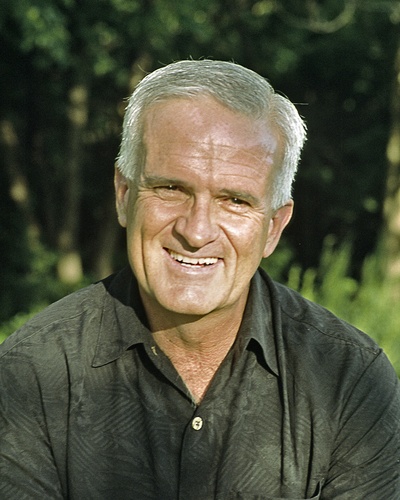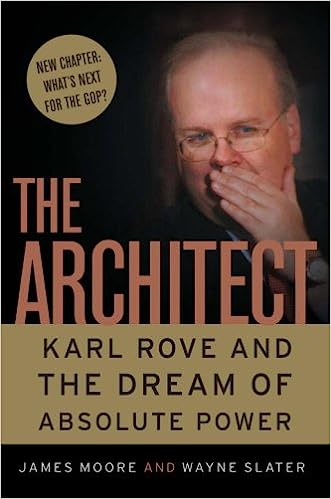
James C. Moore has covered presidential politics for decades. He’s got some stories to tell. His book Bush’s Brain is a New York Times bestseller. Let’s get right to it.
As a television news correspondent by trade, you’ve traveled frequently, attending national political conventions and such for forty years. What’s your favorite foreign locale visited? Why?
This is a seemingly impossible question to answer. There are so many beautiful places in the world and I feel like I have seen so few. Of the locales I have visited, I have been stunned by the Western Coast of Newfoundland, the volcanoes in El Salvador, the coastline of Cuba, the Cote D’Azur on the French Mediterranean, the Virgin Islands, the Canadian Rockies, the American Grand Canyon. But I think my favorite place in the world is Australia. The country is a bit like a giant national park; there are only 22 million people living on a continent the size of America. The culture is oriented toward the outdoors, there are mountains, though none as high as the Rockies, amazing beaches, intriguing deserts and tropical forests, beautiful and well-maintained communities, and just the mystery of the Outback; plus the weather is usually quite balmy. The people are also wonderful and treat life as the party it is meant to be.
Ever since childhood you wanted to write. With six books now published – and a seventh on its way – do you consider your youthful dream fulfilled or in continuation?
No, my dream is not fulfilled. I’ve written mostly non-fiction and I’ve always wanted to write literature, novels about the human condition. Making your way in fiction is very difficult. There is less risk for publishers with non-fiction because they can read your book proposal and make a risk assessment of its chances. Not the same with fiction. They simply decide if they like what is written and whether they want to take a chance. I’d consider my youthful dreams of being a successful writer fulfilled if I were able to write full time for a living but that is not presently possible. I do a number of other things like business consulting and TV production and am forced to write in my spare time. I think if I ever had a big breakout book I might be able to devote my life completely to writing but that hasn’t happened yet. My greatest dream would be to ride around the world on my motorcycle with my bride Mary Lou and simply see the world and write about it. I’ve done a lot of motorcycling and writing about my travels but not enough to make any money or sustain the travel.

You’re decidedly not a fan of Karl Rove, who’s the subject of Bush’s Brain. What about “The Architect” most impresses you?
I met Karl for the first time when I interviewed him for a local news broadcast in Austin in 1978. After the interview when we were loading the camera gear into the truck, I told my photographer that if Karl ever got any real power we’d all be in trouble. I knew after five minutes with him that he had ambitions so great that nothing else mattered beyond his achievement of power and influence. Ambition and focus can be great things but not if they are mostly about self and control of others. If there is anything I admire about Karl it is his memory and his voracious reading appetite. He is interested in the world. There is one story in one of my books about him getting tickets to a professional football game from a friend and Karl sat and read a presidential history during timeouts and ended up missing most of the game because the book was more consuming for him. I think that’s pretty much how I am, but that would be the only thing I have in common with Karl.
Did any of your books have lofty sales expectations?
Bush’s Brain was a surprise New York Times and Washington Post best seller. My agent had a hard time getting a publisher. Karl was relatively unknown even after the election cycle. But when the mid-term elections went very well in Bush’s first term, which rarely happens for a president, Rove got the credit and more attention, and I found a publisher. The book would’ve probably done much better but it was released in March of 2003 at the exact same time we were invading Iraq and that covered up much of the exposure. People didn’t want the back story just then; they wanted to know about what was happening in the war, not how we’d been manipulated into it.

Have you looked into comparable Democrats, namely Dick Morris (now a Republican) and David Axelrod? Are they similar?
Morris worked here in Texas with Gov. Mark White in the early 80s. I didn’t care for him then and never thought he was a Democrat. His personal behavior affected his credibility over time and his conversion to the other side of the aisle as a matter of money and convenience were not a help either. His predictions are consistently wrong and no one takes him seriously any more. I find him to be quite laughable.
I don’t know David, personally, but his work has been consistent and his core beliefs have remained unchanged. I disagreed with some of his tactics for the Obama campaign and later in the administration, but I think he earned his keep. The great tragedy of the Obama administration has been the GOP’s refusal to compromise with the president and I think early on Axelrod’s failure to try to make deals happen harmed the president’s initial years. David was convinced they could go it alone and he was wrong.
Big Bend Strategies, a multipurpose consulting firm, boasts some big clients. How did y’all grow? Is this business gratifying?
Big Bend is simply an outgrowth of my experiences and my main business partner’s. I was a journalist for a long time, understand media, and then I was an executive for a global PR firm. When you combine those experiences with a breadth of political knowledge and background, my resume has appeal to businesses trying to understand those landscapes. We’ve consulted for a number of companies on projects ranging from crisis communications to raising capital to messaging, marketing, sales, and anything a company needs to jumpstart. We’ve been fortunate that the phone rings for us without much marketing and we get inbound inquiries. The work is often difficult and stressful but when you help someone achieve his or her business goals it is very rewarding.

You’re also involved with tech startups. Please describe your role. What advice would you give to prospective entrepreneurs?
Latakoo has been an educational experience, and, frankly not a good one. If I were to give advice to anyone thinking of becoming an entrepreneur, my first piece of counsel would be that they consider very carefully before going into business with friends. You can destroy companies and friendships with disagreements over how to get things done. Latakoo had great potential but has hardly grown in its five years of existence. I left the company over disagreements with the management, a husband and wife team, though I am still a major shareholder and raised a great deal of the founding capital. I do, however, continue to consult for technology companies in Austin and I see a lot of great things happening. Anyone who wants to start a [venture-capital-backed] company has to believe strongly in their idea, have a vision, know how to raise money, and be willing to work until they fall over, if they hope to succeed. There are days when it seems like every idea has already been used but then something new arises and I am floored. Technology is extremely exciting to me.
Learn more about James C. Moore
- Texas to the World – his personal blog
- MooreThink.com – his other personal blog
- Twitter profile – @MooreThink
- Huffington Post articles archive
- JaneFriedman.com Q&A
- Speakerpedia.com biography
- Big Bend Strategies – “Marketing, Media, and Messaging” (his consulting company)
- CNN Opinion piece – “Trump may shoot himself in the foot with a split-city GOP convention”
Books by James C. Moore
- Bush’s Brain: How Karl Rove Made George W. Bush Presidential
- The Architect: Karl Rove and the Dream of Absolute Power
- Bush’s War For Reelection: Iraq, the White House, and the People
- Rove Exposed: How Bush’s Brain Fooled America
- In the Time of Man – a work of science fiction
James C. Moore is a bestselling author, business consultant, and Emmy Award-winning journalist.
Want to continue your learning on political subjects? Read our interviews with Ronald Reagan biographer Craig Shirley, mega-bestselling history author Larry Schweikart, and Edmund Burke scholar Ian Crowe.